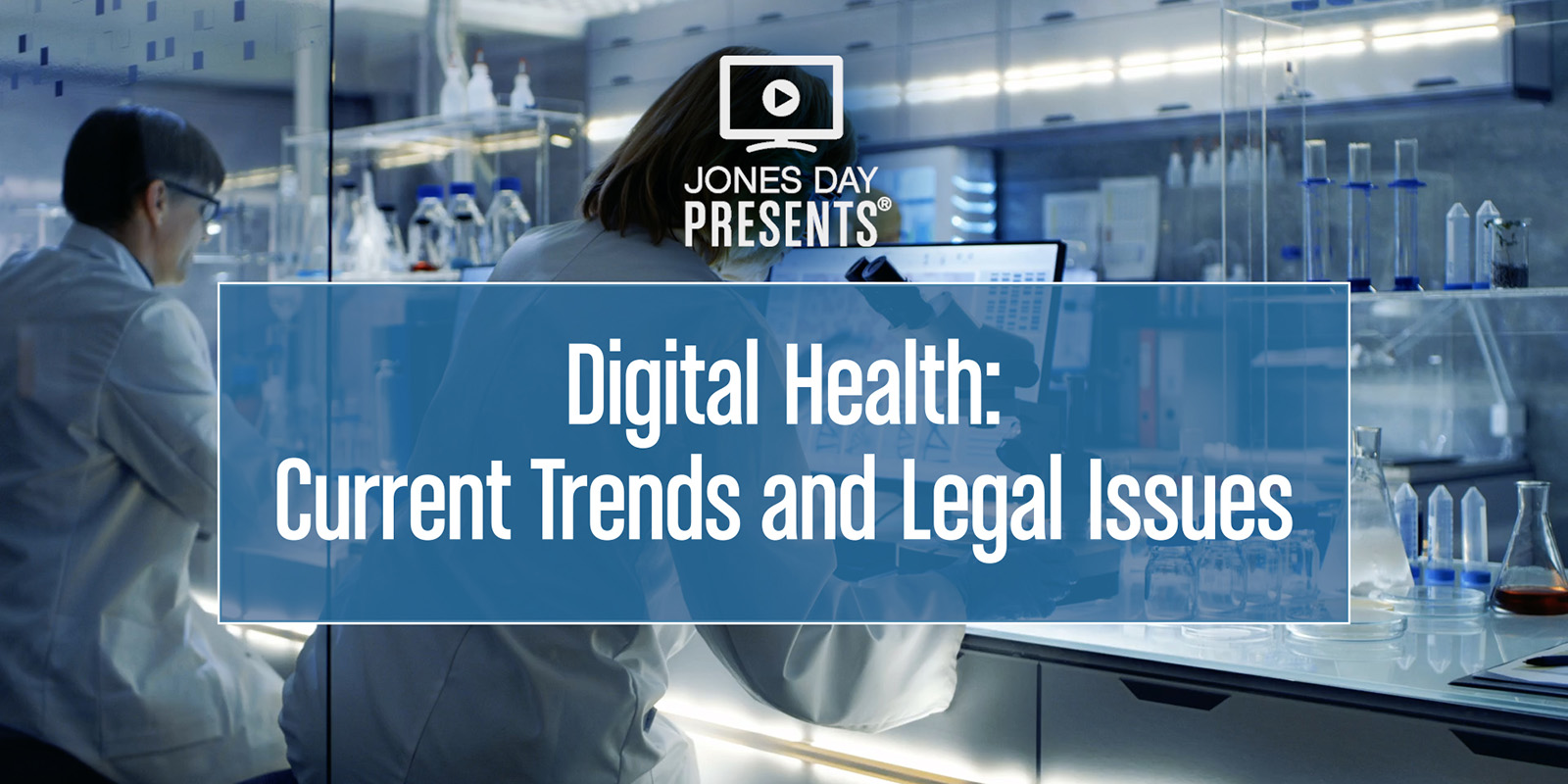
JONES DAY PRESENTS® Digital Health: Current Trends and Legal Issues
The adoption of digital health technologies introduces a new range of efficiencies for health care delivery and marks a significant breakthrough in research and development capabilities for the life sciences industry. Jones Day's Alexis Gilroy, Maureen Bennett, and Cristiana Spontoni talk about trends in digital health applications and discuss the legal and regulatory issues attendant to the growth and wide acceptance of this new era in medicine.
Read the full transcript below:
Alexis Gilroy:
Digital health is really just using technology in lots of different ways to transform how healthcare services are delivered or actually formed in the case of life science companies. You take anything from telemedicine, which is really using a smartphone to enable patients to engage with their provider, or artificial intelligence and other tech-enabled tools that are advancing diagnostic capabilities, or you're now looking at things like digiceuticals, which is really just a software for treatment.
Cristiana Spontoni:
So very often, you have now traditional pharmaceutical companies cooperating with medical devices companies, technology companies, telecommunications companies in a way that is completely new. And so each of these actors in the value chain will have different questions depending on the angle they've traditionally had.
Maureen Bennett:
There's no question that the rapidity of change in our industry is exponential. Five years ago, digital health was still in its infancy, and now it is really a centerpiece for this life sciences industry. And what's also the case is that the areas of drug development utilize technologies that were not imagined just a few years ago. It used to be here's the pill, here's the medication to treat the manifestations of a disease. Now we're looking at ways of controlling disease that go back and talk about amending one's genes or one's cells to try and address a problem before it actually comes to fruition.
Alexis Gilroy:
It's important to understand that digital health is a type of delivering care, or in the case of life science company, it's a type of developing processes and new treatment capabilities using technology tools for efficiencies and so forth. So you see health regulatory legal issues, you see data privacy legal issues, you see intellectual property issues because much of what you're developing is IP. So you need to properly protect those issues. You're also seeing various different transactional issues. With almost any digital health project, you involve multiple parties. Because of that, you have transactional issues, partnership issues, contractual issues. And various people have different approaches. Are you the payer that wants to use a particular digital tool? Are you the provider that wants to use a particular digital tool?
Alexis Gilroy:
So it really runs the gamut. We see the future of a variety of needs on product liability. When you talk about artificial intelligence related tools in the context of healthcare, and these tools are advancing diagnostic capabilities, well, at a certain point, who's going to determine who's liable if it's the tool who's actually making a diagnostic competency function, or is it the provider who is? And the regulators are really increasingly struggling with that issue as well. Can they regulate a machine like they would regulate a human being?
Cristiana Spontoni:
Digital technologies really are disruptive. And so they're disruptive in two ways. In one way, they're breaking traditional geographical borders. And so we need laws to be more and more aligned, and we need lawyers and regulators to work together to find common solutions. The other barrier that is coming down is really the old fashioned rules that we have that have been designed having a completely different reality in mind from a scientific perspective, and now these rules need to be adapted.
Alexis Gilroy:
Traditional healthcare regulations were very jurisdictional specific. All 50 states defined what is the practice of medicine, defines how you practice telemedicine. So when you look at scaling an offering that doesn't rely on jurisdictional bounds, right? We are no longer living in an environment where bricks and mortar healthcare are defined by their location. So the legal parameters for that really impact how regulators are thinking about this and actually how consumers can access that care.
Cristiana Spontoni:
Pharma law and life sciences regulatory rules are very much entrenched in the social, cultural, and historic background of a particular country. And so we cannot obliterate all of that in a nanosecond and we shouldn't. But do we need common rules? Do we need common framework so that everybody understands what the rules of the game are? Absolutely. Because businesses cannot deal with a myriad of different rules depending on the jurisdiction and sometimes even within the same jurisdiction. So we need a common understanding and some flexibility to keep some adaptability of the system at national and local level.
Alexis Gilroy:
It really is a bipartisan issue, an issue that we all should benefit from both as consumers and patients.



